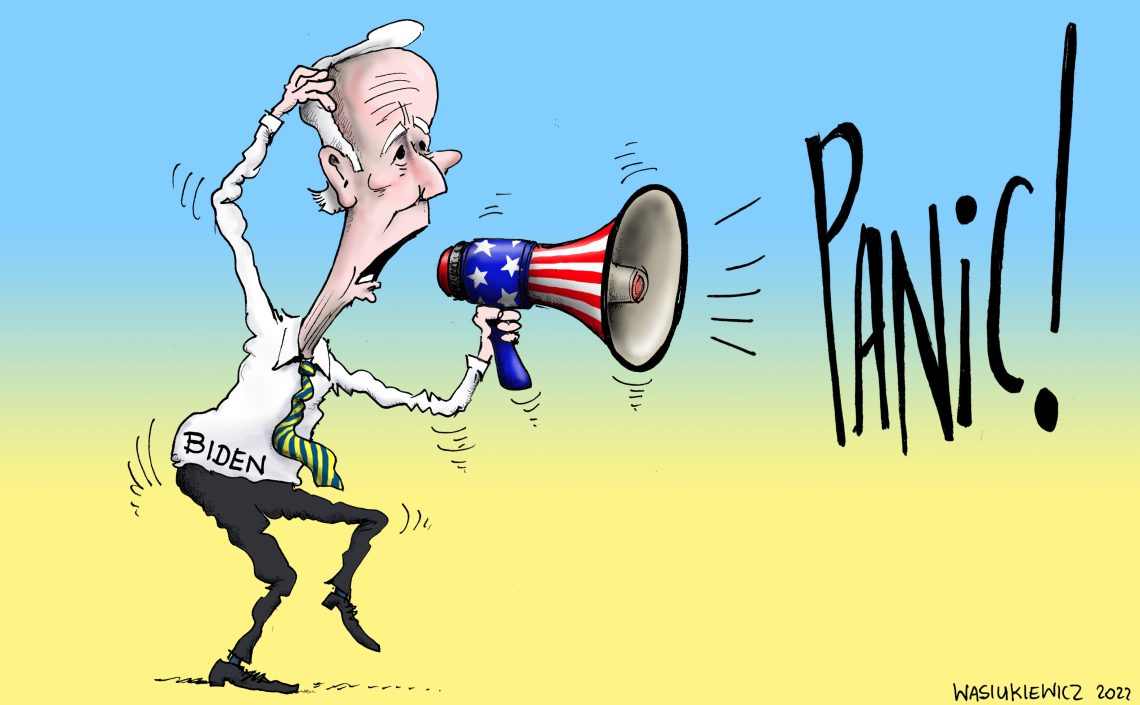Washington’s Ukraine invasion enigma
It is puzzling that the White House is stirring up panic over Ukraine when a better approach would be to show quiet determination.

Even before Russian President Vladimir Putin decided to send Russian troops into the Donetsk and Luhansk regions, the situation in Ukraine overshadowed all other geopolitical topics in the international media. There was little reporting on events in Africa, where there have been important political developments, like the retreat of France from Mali and Turkish President Recep Tayyip Erdogan’s trip to three countries on the continent. Additionally, Turkey’s relationships with countries in the Gulf and with Israel are improving. Cooperation between Israel and the United Arab Emirates – only recently established – is deepening.
The West’s position on Ukraine still remains the big question. So far there has been a lot of verbal encouragement, but few clear commitments. As of publishing, it is uncertain how the United States and Europe will react to the Russian troop movements. NATO has increased its footprint in the Baltic states, Poland and Romania, while making it clear that it will abstain from military intervention. Many Western countries threatened sanctions against Russia, but the absence of specifics reduced their credibility to the point where President Putin believed he could move the Russian military into Donbas with impunity. The Ukrainian defense forces continue to receive arms and equipment from many countries, especially Turkey, the United Kingdom and the U.S., while Germany’s offer of 5,000 helmets looked ridiculous.
Unfortunately for Ukraine, the country is a chip in a bigger geopolitical poker game between the West and Russia. Instability in areas of Ukraine will prevent it from joining NATO, fulfilling Moscow’s strategic goals as long as it cannot obtain a commitment that the country will not accede to the alliance. The Minsk Protocol, meant to end the violence in eastern Ukraine, had many inconsistencies. It might have worked in an atmosphere of consent and good faith, but not under the climate of contention that prevailed. By openly moving its troops into the breakaway Ukrainian regions, Russia has now officially contravened the Minsk agreements, which call for all foreign forces to leave the area.
The West tends to view the conflict through the prism of the Helsinki Accords, while Moscow has not forgotten the philosophy of the Yalta agreement. Both sides interpret agreements reached at the time of German unification and NATO enlargement differently.
Russia’s troop movements around Ukraine and into the Donbas region are indeed scary, but they are not sufficient to mount a full-scale invasion of such a large country. The crisis has created an environment of panic and insecurity, where it is easy for non-state actors like those in Donbas to engage in destabilizing activities.
While Russia’s concerns deserve to be heard with respect, it is also necessary for the West to show determination – the positions taken by Poland, Turkey and the UK are good examples.
What is hard to understand is Washington’s frequent warnings that a full-scale, countrywide invasion is imminent. It is a real enigma and could help Moscow argue that the West is being belligerent. It also encourages partisans and non-state actors on both sides to act. It is not necessary for the U.S. to cry wolf.
Prior to Russia’s movements into Donbas, U.S. President Joe Biden and National Security Advisor Jake Sullivan had repeatedly declared that an all-out Russian invasion was only days away. The U.S. government advised its citizens to leave Ukraine and moved its embassy from Kyiv to Lviv, close to the Polish border. Instead of doing what was needed – bolstering a spirit of confidence in Ukraine – these moves signal retreat. (Switzerland, on the other hand, merely warned its citizens in the Donetsk and Luhansk regions.)
It is necessary to show resolve. In 2008, when Georgia was threatened and it was feared that Tbilisi could be bombed, several leaders visited the city – the late Polish President Lech Kaczynski among them – and it was crucial that U.S. Secretary of State Condoleezza Rice did so as well, in a clear sign of solidarity. This helped, and proved the West’s commitment to Georgia’s sovereignty.
In 1956, when the Soviets brutally crushed a noncommunist regime in Budapest, the U.S. embassy remained in operation and for 15 years gave shelter to Cardinal Jozsef Mindszenty, an anti-communist icon in Hungary. This spirit of standing firm without panicking seems lost not only in Western Europe, but also in today’s Washington.
Although Ukrainian President Volodymyr Zelenskiy, a determined and brave leader, has been clear about his gratitude to the U.S., Washington’s anxious attitude is a problem for him. He has called for calm but emphasizes the need to specify sanctions as a real deterrent.
The puzzle remains what basis Washington has for assuming that a large-scale invasion is bound to happen. Some have even compared the situation with the U.S.’s push to invade Iraq – but the circumstances are quite different.
